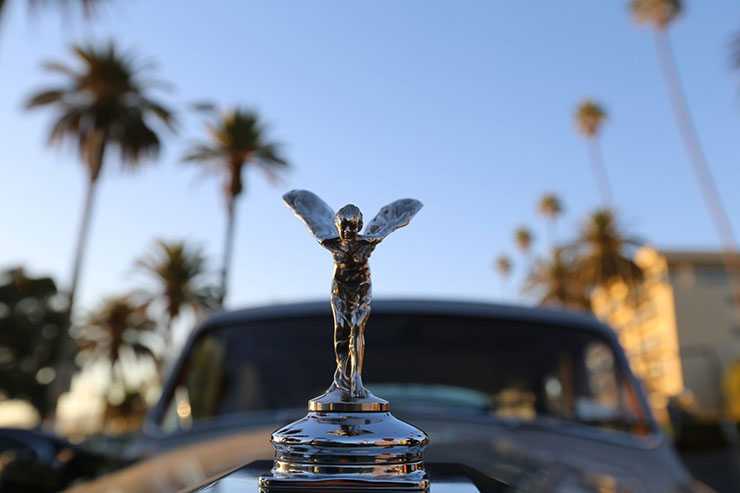
Photos Courtesy Oscilloscope Laboratories.
The star of “The King,” an ambitious, politically minded documentary that posits Elvis Presley as the embodiment of the rise and fall of the American empire, is not the titular superstar, but his set of wheels. And we're not talking about a pink Cadillac, either.
Director Eugene Jarecki trots out the oft-imitated performer's 1963 Rolls-Royce and takes it out on the road from sea to shining sea, with several strategic stops along the way. That the vintage sedan is not an American-made piece of machinery is one of several ironies that pave this rickety ride's journey into the United States' less-than-virtuous psyche. But even as it overreaches (boy, and how), this slickly produced “biodoc” of sorts still coaxes the viewer's attention, simply by having the gall to ask tough questions and, in some cases, including talking heads who are not exactly fans of the King.
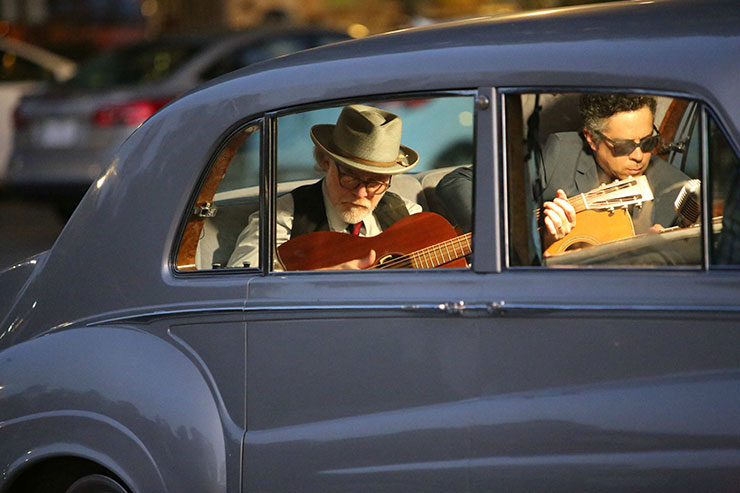
Mike Coykendall, M. Ward
An early stop in the singer's birthplace of Tupelo, Mississippi gives Jarecki an opportunity to show how progress appears to have passed by the small city. Details from Presley's childhood and adolescence in the segregated South are scant, as the filmmaker strains to stay on message. His meteoric rise to stardom mirrors the country's more prosperous days. As a hard-hitting counterpoint, the documentary depicts the working class residents of the street where Presley once lived as struggling and disillusioned. “Tupelo is going to hell,” says a woman of a certain age.
Musical acts like EmiSunshine and the Rain, M. Ward and Emmylou Harris step into the Rolls' back seat to play and/or share their thoughts on Presley's legacy and, in Harris' case, compare the star to a Greek tragic figure. But Jarecki can't wait to cut away from these performances to stay on message. For the Emmy-winning director, music is a gateway into a controversy that has dogged Presley: how he used African-American sounds to cross over to a more mainstream, predominantly white audience.
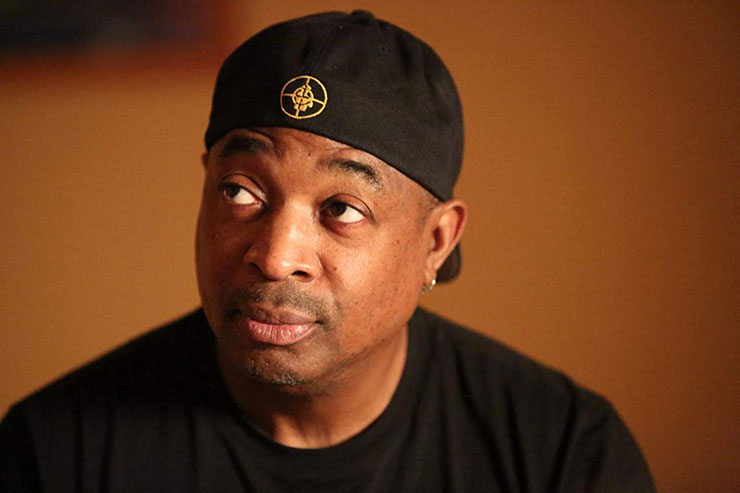
Chuck D
Public Enemy's Chuck D, who clearly doesn't suffer fools lightly, gives Jarecki a piece of his mind when it comes to the way Presley appropriated music from black performers like Arthur Crudup (“That's All Right”) and Willie Mae “Big Mama” Thornton (“Hound Dog”) to catapult into the zeitgeist. David Simon, the creator of the HBO series “The Wire,” has a more pragmatic outlook. “The entire American experience is about cultural appropriation,” he says.
As “The King” moves to Memphis and Nashville to trace Presley's career as his sound became more polished, Jarecki invites an eclectic array of figures, including Simon, Alec Baldwin, Ethan Hawke and Ashton Kutcher, to take a ride in the Rolls. A sit-down with a now heavy-set Mike Myers adds a Canadian perspective to this very American topic. This is all engaging enough, but Jarecki's approach limits his meditation on Presley as a cerebral endeavor. An all-too-brief moment that shows singer-songwriter John Hiatt breaking down in tears when he steps into Presley's car stands out because it's such an isolated moment for a movie that could have used more of that emotional resonance.
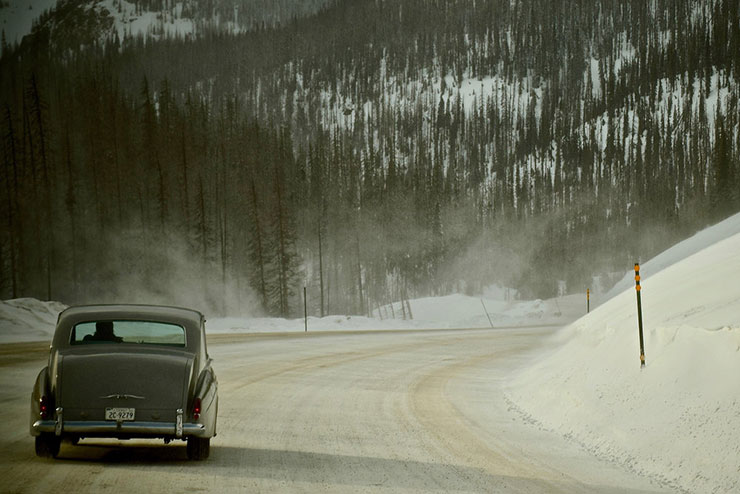
But there's another agenda at play here. It becomes apparent early on that this road trip was shot in 2016, giving Jarecki a chance to pile on another layer. As the documentary follows Elvis' stint in the Armed Forces during the Cold War and ensuing absence from the civil rights movement (Chuck D has a few choice words about that last part), Jarecki takes pains to follow the presidential campaign, as well as the increasing discord between citizens of opposing political parties.
“Trump's not going to win,” says Baldwin, echoing a widespread sentiment that lulled part of the nation into a sense of complacency. Jarecki juxtaposes the film's depiction of the rise of Trump's America with his portrait of Elvis as a metaphor for the nation. Elvis is the USA and the USA is Elvis, and the two, he argues, are intrinsically fused in our collective unsconscious.
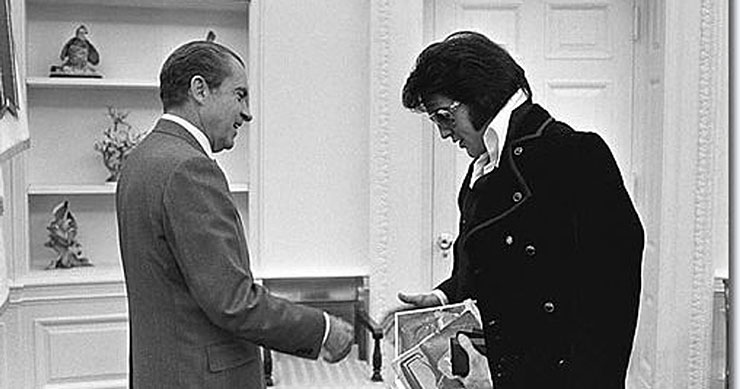
Richard Nixon, Elvis Presley
As a concept to propel a two-hour movie, this is just too much to handle. It's rare when a filmmaker is able to pull it off. The nearly eight-hour “O.J.: Made in America” does comes to mind as a brilliant exception to the rule. To his credit, Jarecki inserts bits that show interview subjects and even a crew member calling him out on his folly. “This is a reach,” says Simon, the voice of sanity here.
When the road crew chief tells Jarecki, “I don't think you know what you're doing,” he sounds like the wisest person on screen, even more so than, say, Dan Rather, who shares his insights on Presley from the top of the Empire State Building.
As “The King” cruises by the Big Apple, Jarecki cross-cuts between clips from Presley movies and the 1933 version of “King Kong.” We get it: Presley is turned into a sideshow, a revenue source who loses sight of what made him special in the first place. The film inevitably arrives in Las Vegas, and this is where the film starts to feel more familiar. “He told me, 'I recognize I'm self-destructive,'” says ex-girlfriend Linda Thompson, foreshadowing Presley's untimely death at age 42.

Linda Thompson, Photo Courtesy Oscilloscope Laboratories.
But the tragedy that unfolds before our eyes is not so much the performer spiraling into a premature, drug-fueled decline as it is Jarecki's failure to capture his transcendental, cross-generational appeal. The gifted documentarian (“Why We Fight,” “The House I Live In”) finds himself more than a little flummoxed by his subject, and that lack of assurance yields a messy, undisciplined film that's easy to appreciate for its sheer scope and but difficult to enjoy. The more hell-bent Jarecki is on likening Presley to the soul of the nation, the more the subject eludes his grasp.
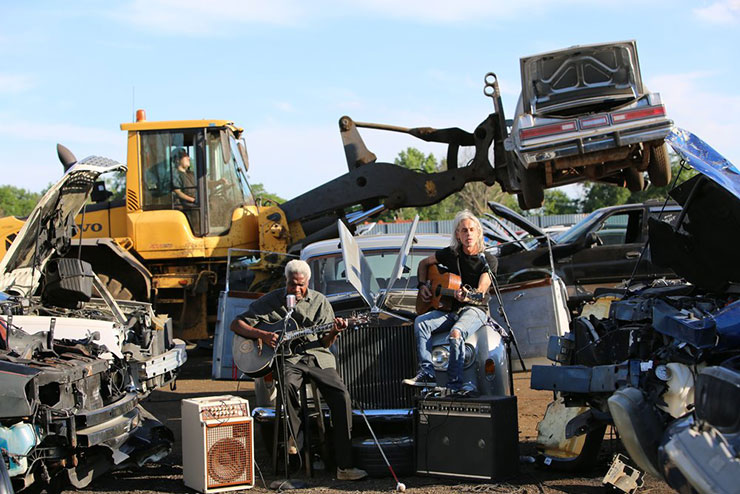
Robert Bradley, Matthew J. Ruffino, Photos Courtesy Oscilloscope Laboratories.
Jarecki has made a film about a musical talent where the music plays second fiddle to the politics. He's so busy connecting the thematic dots that the portrait of Presley that ultimately emerges rings hollow. In a film intent on pointing out ironies, the biggest one of all is a filmmaker who tries so hard to find novel ways of deconstructing an icon but ends up with a reductive travelogue that's cut at the knees. Rarely has such a fascinating subject left this critic so cold.
“The King” is now playing at the Miami Beach Cinematheque and Living Room Theatres FAU in Boca Raton.




